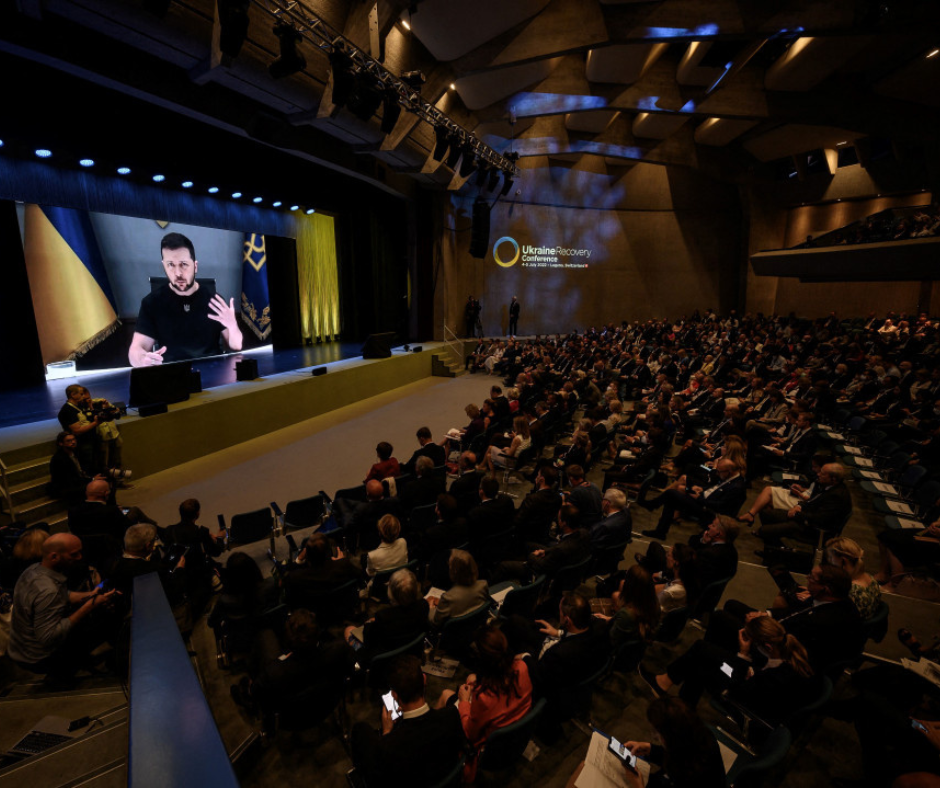On July 4-5, the Ukraine recovery conference was held in Lugano (Switzerland). The event was originally planned as the fifth conference on reforms in Ukraine – an annual political event where the country demonstrates the progress it has made, and all stakeholders determine the sequence of measures that must be implemented for further reform. However, the full-scale war changed the organizers` plans, so from the beginning of the open russia`s invasion, Ukraine and Switzerland jointly decided to dedicate the conference to the reconstruction of Ukraine. Representatives of more than 40 countries and 16 international organizations took part in this event.
Ukrainian environmentalists also participated in the conference, calling for “green” post-war reconstruction. What did officials agree on and what was presented at the conference?
National recovery Plan presentation
In April, the President of Ukraine created the National Recovery Council, headed by Prime Minister Denys Shmyhal. The National Council and working groups from various areas (economic recovery, energy security, eco-security, etc.) began active work in May, preparing the National Recovery Plan for six weeks. This year’s conference was focused on this National Plan and its presentation.
“The national plan is a kind of wish list. For example, in the energy sector, the government’s proposed projects and plans include everything from the construction of new nuclear power plants to oil and gas production, hydrogen, and renewable energy sources. The priorities for the sector`s development have not been determined, although it should happen.
We did not see such reactions from our partners, or proposals for changes, or improvements, but they once again declared their readiness to help Ukraine and emphasized the importance of “ownership” of reconstruction projects (projects should be initiated “from below”, and not dictated “from above” by the Europeans themselves).
During the conference, the Minister of Communities and Territories Development emphasized that our country cannot wait for the end of the war. And the revival of Ukraine should be determined by several factors, including structural reforms, the rule of law, anti-corruption, and judicial reforms,” says Anna Ackermann, an expert in climate and energy policy.
Natalia Gozak, Executive Director of the Center for Environmental Initiatives “Ecoaction”, said:
“Together with many other organizations we had a chance to propose our ideas for the National Reconstruction Plan. And even though the process was rather inclusive, we see that the Ukrainian government perceives “environmental recovery” as a way to promote the expansion of the nuclear sector and fossil fuel projects (such as gas exports), with additional focus on hydrogen and bioenergy without saying what it’s made of. We can’t afford continuing our dependency on unsustainable energy solutions. Instead, we should be thinking in the longer term, making sure that Ukraine develops as a modern economy based on sustainable renewables and energy efficiency”.
Public involvement in the National Plan development
Many public organizations joined working groups in various sectors (Ecoclub among them) and submitted their proposals to the National Recovery Plan. After that, secretaries, curators of working groups, and the Cabinet of Ministers determined what should be included in the Plan.
“If we talk about “public” more broadly, then, for example, the cities` involvement was quite limited. Representatives of city associations participated in the working groups, but the presence of mayors or heads of communities would be extremely valuable for a better understanding of the whole situation and community needs in the short, medium, and long terms.
The public was partially involved: to determine the impact, it is necessary to study all the documents and analyze which proposals were included in the final document and which were not. For example, we know that in the energy security sector, it was possible to add public proposals on improving energy efficiency standards during the reconstruction of destroyed buildings, on the establishment of the heat pump production sector, etc.”, Anna Ackermann said.
The presented Recovery Plan is not the final version of the document. Prime Minister Denys Shmyhal emphasized that further discussions will take place in working groups, so it will be finalized.
Ecoclub`s representatives are members of three groups: environmental safety, energy safety, construction, and urban planning.
In the subgroup on environmental security, we emphasized that the plan should take into account the consequences of climate change, nature-oriented measures to adapt to them, and measures to mitigate the consequences of climate change.
As part of the working group “Construction, urban planning, modernization of cities and regions”, Ecoclub emphasized the preservation and development of central heating using low-carbon technologies:
“Central heating – an important resource for Ukraine’s energy independence and the fulfillment of climate obligations (Ukraine’s Nationally Determined Contribution to the Paris Agreement). The next heating season will be the most difficult in all the years of independence: Ukraine currently has the smallest gas reserves, as a result of shelling the heating facilities, and there is a complete lack of forecasting of gas imports and production.
Some solutions may not be low-carbon (coal boilers, individual heating, etc.), but they will help to survive the coming winter. These solutions must be temporary. Germany, the leader in the field of energy efficiency in Europe, is actively working on expanding the central heating network: in Germany, only 22% of the population receives heat centrally, and in Ukraine – about 50%,“ says Ecoclub expert Dmytro Sakaliuk.
The results of the conference – Outcome Document “Lugano Declaration”
The result of the conference was a joint declaration that defines the Principles of Ukraine`s Recovery (the Lugano Principles). Among the principles:
- Partnership. Ukraine will lead the recovery process and implement it together with international partners.
- Focus on reforms.
- Transparency, accountability, Rule of Law.
- Democratic participation.
- Involvement of many stakeholders.
- Gender equality and inclusion.
- Sustainable development.











